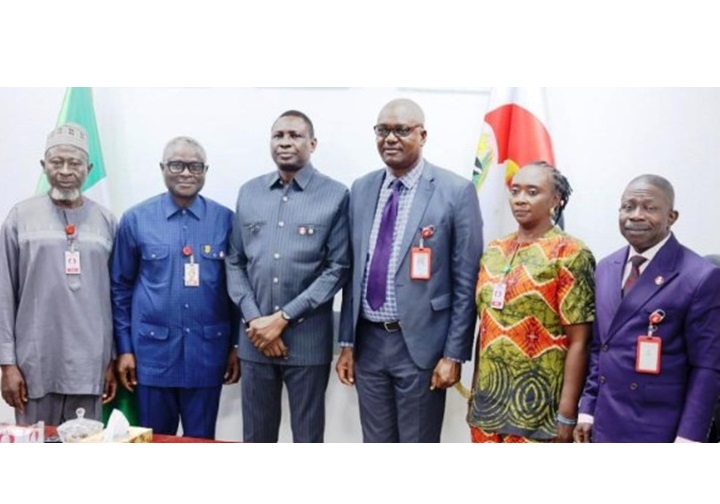The Citizenship and Leadership Training Centre, an agency under the Ministry of Youth Development, has called for an intensified partnership with the Economic and Financial Crimes Commission (EFCC) to enhance leadership and value orientation among Nigerian youth.
This request was made during a courtesy visit by the Centre’s management team to the EFCC’s headquarters in Abuja on Thursday, August 1, 2024.
Leading the delegation, Director General Adesoji Eniade highlighted the existing collaboration between the Centre and the EFCC, which has facilitated the training of EFCC cadets at the Centre’s Shere Hills Institute in Jos, Plateau State. Eniade emphasised the importance of this training in equipping young EFCC officers with essential leadership skills and values.
“The purpose of our visit is to seek an enhanced collaboration with the EFCC. Last year, we trained about 400 EFCC cadets at our Shere Hills Institute, and we wish to make this an ongoing tradition. These young officers are the future of the Commission, and exposing them to critical training in citizenship and leadership is vital for their development,” Eniade stated.

He further proposed extending value reorientation training to cybercrime convicts, aiming to rehabilitate them into productive citizens after serving their sentences. “Once they have served their punishment, they should undergo value reorientation training at our institution to understand why they need to be good and productive citizens,” he added.
In response, EFCC Executive Chairman, Mr. Ola Olukoyede, expressed gratitude for the visit and praised the Centre’s efforts in promoting societal value reorientation. He assured the delegation of the EFCC’s commitment to strengthening their collaboration.
“I promise that we will enhance our relationship and take it to the next level. I appreciate your work in promoting a good value system and culture among citizens. Our societal values need significant improvement, which is essential in our fight against corruption,” Olukoyede remarked.
He acknowledged the importance of value orientation within the EFCC and mentioned ongoing efforts to establish a Cybercrime Research Centre at the EFCC Academy. This centre aims to reorient cybercrime ex-convicts and add value to their lives. However, he noted that formal approval for reorientation training of ex-convicts lies outside the EFCC’s mandate.
“Your request for approval to reorient convicted cybercriminals is beyond our direct mandate, although we are exploring this as a policy initiative. We prosecute and secure convictions, and typically, our responsibility ends there. However, we are keen to support this initiative. I suggest you also engage with the leadership of the Custodial Services, as they manage the reorientation programmes for ex-convicts. A collaboration between your Centre, the Custodial Services, and the EFCC could be highly beneficial,” Olukoyede suggested.
Eniade underscored the critical roles of leadership and citizenship in national development, explaining that the Centre’s mission is to build these attributes among the youth population. “When you look at national development, two critical factors are leadership and citizenship. Our institution is dedicated to cultivating these qualities in young people,” he said.
The visit concluded with mutual agreements to explore further areas of collaboration. The EFCC and the Citizenship and Leadership Training Centre envision a future where young officers are well-equipped with leadership values and where ex-convicts are given opportunities to reintegrate into society as reformed individuals.
The partnership aims to address the root causes of corruption and crime by instilling strong moral values and leadership qualities in the youth, ultimately contributing to a more just and prosperous Nigeria.
As Nigeria continues to confront the challenges of cybercrime and corruption, the collaboration between the EFCC and the Citizenship and Leadership Training Centre represents a proactive step towards fostering a culture of integrity and accountability. By focusing on leadership development and value reorientation, both institutions aim to build a robust foundation for the nation’s future leaders and rehabilitate those who have strayed, ensuring they become productive members of society.
This initiative highlights the importance of multi-agency cooperation in addressing complex societal issues, underscoring the shared responsibility of various sectors in driving national development and ethical reform.
Support InfoStride News' Credible Journalism: Only credible journalism can guarantee a fair, accountable and transparent society, including democracy and government. It involves a lot of efforts and money. We need your support. Click here to Donate
